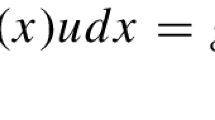Abstract
Regularization of the classical optimality conditions—the Lagrange principle and the Pontryagin maximum principle—in a convex optimal control problem subject to functional equality and inequality constraints is considered. The controlled system is described by a linear functional-operator equation of second kind of the general form in the space \(L_{2}^{m}\). The main operator on the right-hand side of the equation is assumed to be quasi-nilpotent. The objective functional to be minimized is strongly convex. The derivation of the regularized classical optimality conditions is based on the use of the dual regularization method. The main purpose of the regularized Lagrange principle and regularized Pontryagin maximum principle is to stably generate minimizing approximate solutions in the sense of J. Warga. The regularized classical optimality conditions (1) are formulated as existence theorems of minimizing approximate solutions in the original problem with simultaneous constructive representation of these solutions; (2) are expressed in terms of regular classical Lagrange and Hamilton–Pontryagin functions; (3) are sequential generalizations of the classical analogs, which are limiting versions of the generalizations, while preserving the general structure of the classical analogs; (4) “overcome” ill-posedness properties of the classical optimality conditions and provide regularizing algorithms for solving optimization problems. As an application of the results obtained for the general linear functional-operator equation of second kind, two examples of concrete optimal control problems related to a system of delay equations and to an integro-differential transport equation are discussed.
Similar content being viewed by others
REFERENCES
V. M. Alekseev, V. M. Tikhomirov, and S. V. Fomin, Optimal Control (Nauka, Moscow, 1979) [in Russian].
V. M. Tikhomirov, Tales about Maximums and Minimums (Nauka, Moscow, 1986) [in Russian].
R. V. Gamkrelidze, “Mathematical works by L. S. Pontryagin,” Itogi Nauki Tekh., Ser.: Sovr. Mat. Prilozh. 60, 5–23 (1998).
A. V. Arutyunov, G. G. Magaril-Il’yaev, and V. M. Tikhomirov, Pontryagin Maximum Principle: Proof and Applications (Faktorial, Moscow, 2006) [in Russian].
R. V. Gamkrelidze, “The history of Pontryagin maximum principle discovery,” Proc. Steklov Inst. Math. 304, 1–7 (2019).
F. P. Vasil’ev, Optimization Methods (Faktorial, Moscow, 2011) [in Russian].
M. I. Sumin, “Regularized parametric Kuhn–Tucker theorem in a Hilbert space,” Comput. Math. Mat. Phys. 51, 1489–1509 (2011).
M. I. Sumin, “Regularized Lagrange principle and Pontryagin maximum principle in optimal control and in inverse problems,” Tr. Inst. Mat. Mekh. Ural. Otd. Ross. Akad. Nauk 25 (1), 279–296 (2019).
J. Warga, Optimal Control of Differential and Functional Equations (Academic, New York, 1972).
E. G. Gol’shtein, Duality Theory in Mathematical Programming and Its Applications (Nauka, Moscow, 1971) [in Russian].
A. N. Tikhonov and V. Ya. Arsenin, Solutions of Ill-Posed Problems (Nauka, Moscow, 1986; Winston, Washington, 1977).
A. B. Bakushinskii and A. V. Goncharskii, Ill-Posed Problems: Numerical Methods and Applications (Mosk. Gos. Univ., Moscow, 1989) [in Russian].
L. Tonelli, “Sulle equazioni funzionali di Volterra,” Bull. Calcutta Math. Soc. 20, 31–48 (1929).
A. N. Tikhonov, “On functional Volterra equations and their application to some problems of mathematical physics,” Bull. Mosk. Univ., A 1 (8), 1–25 (1938).
P. P. Zabreiko, “On integral Volterra operators,” Usp. Mat. Nauk 22 (1), 167–168 (1967).
C. Corduneanu, Integral Equations and Applications (Cambridge Univ. Press, Cambridge, 1991).
I. V. Shragin, “Abstract Nemytskii operators are locally defined operators,” Sov. Math. Dokl. 17, 354–357 (1976).
V. I. Sumin, “Functional-operator Volterra equations in the theory of optimal control of distributed systems,” Sov. Math. Dokl. 39, 374–378 (1989).
E. S. Zhukovskii, “On the theory of Volterra equations,” Differ. Equations 25 (9), 1132–1137 (1989).
I. Gohberg and M. G. Krein, Theory and Applications of Volterra Operators in Hilbert Space (American Mathematical Society, Providence, 1970).
A. L. Bukhgeim, Volterra Equations and Inverse Problems (Nauka, Novosibirsk, 1983) [in Russian].
S. A. Gusarenko, “On a generalization of the notion of Volterra operator,” Sov. Math. Dokl. 36 (1), 156–159 (1987).
M. Väth, “Abstract Volterra equations of the second kind,” J. Equat. Appl. 10 (9), 125–144 (1998).
E. S. Zhukovskii and M. Zh. Alvesh, “Abstract Volterra operators,” Russ. Math. 52 (3), 1–14 (2008).
V. I. Sumin, Functional Volterra Equations in the Theory of Optimal Control of Distributed Systems (Nizhegor. Gos. Univ., Nizhnii Novgorod, 1992) [in Russian].
V. I. Sumin, and A. V. Chernov, “Operators in spaces of measurable functions: The Volterra property and quasinilpotency,” Differ. Equations 34 (10), 1403–1411 (1998).
V. I. Sumin, “Controllable Volterra functional equations and contraction principle,” Tr. Inst. Mat. Mekh. Ural. Otd. Ross. Akad. Nauk 25 (1), 262–278 (2019).
M. I. Sumin, “On the regularization of classical optimality conditions in convex optimal control problems,” Tr. Inst. Mat. Mekh. Ural. Otd. Ross. Akad. Nauk 26 (2), 252–269 (2020).
N. Dunford and J. T. Schwartz, Linear Operators. General Theory (Interscience, New York, 1958).
Functional Analysis. Ser. Mathematical Library Handbooks, Ed. by S. G. Krein (Nauka, Moscow, 1972) [in Russian].
A. D. Ioffe and V. M. Tikhomirov, Theory of Extremum Value Problems (Nauka, Moscow, 1974) [in Russian].
A. V. Dmitruk, Convex Analysis: Elementary Introductory Course. Textbook (MAKS, Moscow, 2012) [in Russian].
K. Jorgens, “An asymptotic expansion in the theory of neutron transport,” Comm. Pure Appl. Math. 11 (2), 219–242 (1958).
S. F. Morozov, “Nonstationary transport integro-differential equation,” Izv. Vyssh. Uchebn. Zaved., Mat., No. 1, 26–31 (1969).
Ya. A. Kuznetsov and S. F. Morozov, “Well posedness of the mixed problem for the nonstationary transport equation,” Differ. Uravn. 8, 1639–1648 (1972).
Funding
This work was supported by the Russian Foundation for Basic Research (project no. 20-01-00199_a).
Author information
Authors and Affiliations
Corresponding authors
Ethics declarations
The authors declare that they have no conflicts of interest.
Additional information
Translated by A. Klimontovich
Rights and permissions
About this article
Cite this article
Sumin, V.I., Sumin, M.I. Regularization of the Classical Optimality Conditions in Optimal Control Problems for Linear Distributed Systems of Volterra Type. Comput. Math. and Math. Phys. 62, 42–65 (2022). https://doi.org/10.1134/S0965542521110142
Received:
Revised:
Accepted:
Published:
Issue Date:
DOI: https://doi.org/10.1134/S0965542521110142




